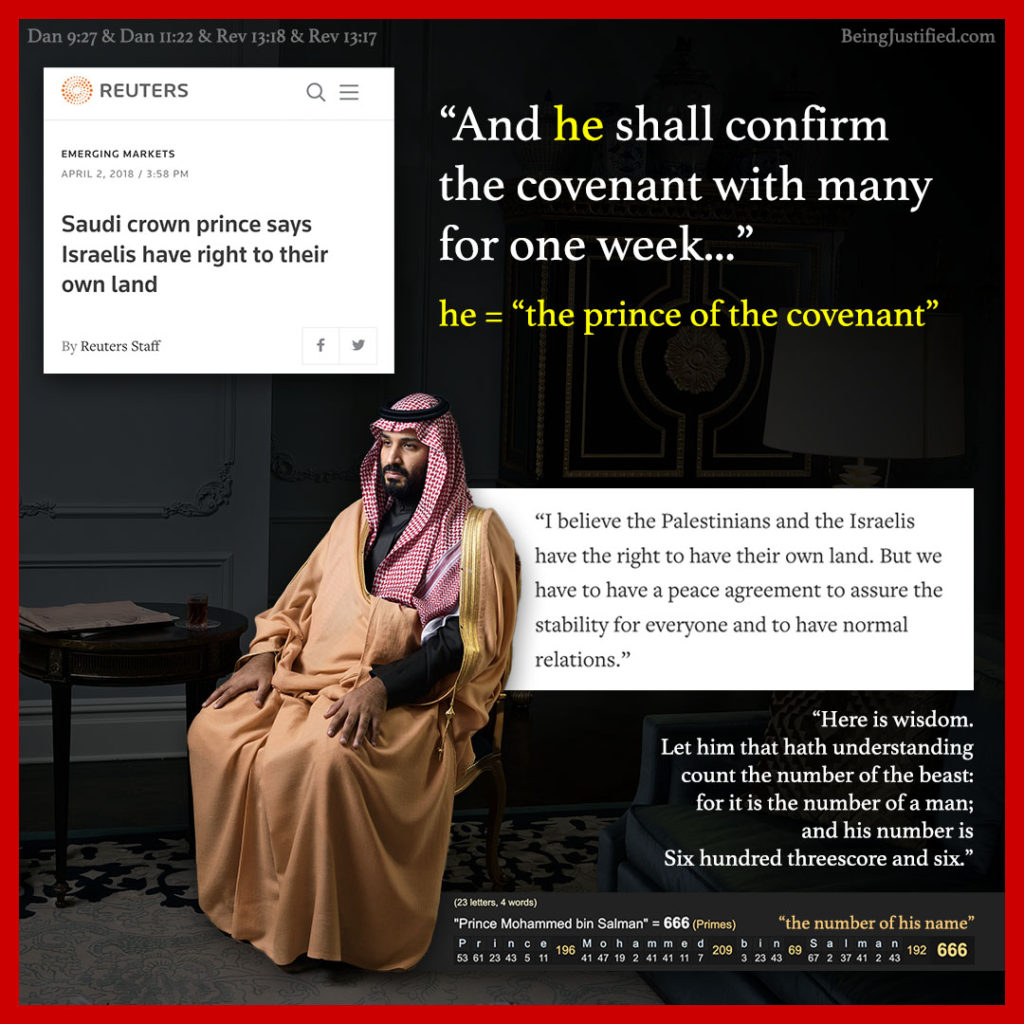Scripture to consider before this special analysis:
“Because ye have said, We have made a covenant with death, and with hell are we at agreement; when the overflowing scourge shall pass through, it shall not come unto us: for we have made lies our refuge, and under falsehood have we hid ourselves:”
Israel may be telling the world it seeks an alliance of life but will soon confirm the covenant which is looking to be the Abraham Accords with the prince of the covenant and beast to start the last days and their final prophetic 70th week spoken of by Daniel the prophet.
“And he shall confirm the covenant with many for one week: and in the midst of the week he shall cause the sacrifice and the oblation to cease, and for the overspreading of abominations he shall make it desolate, even until the consummation, and that determined shall be poured upon the desolate.”
The he that shall confirm the covenant is looking to be Prince Mohammed bin Salman because he comes from a line of 6 kings from the royal family of Saud and has the number of the beast to his name and is in a position to be the big player to sign onto the Abraham Accords with Israel. That’s why all this madness is happening around the world right now, because the last days are about to start.
42 months after the confirmation of the covenant by the prince will he receive a mortal wound and disannul the covenant.
“And your covenant with death shall be disannulled, and your agreement with hell shall not stand; when the overflowing scourge shall pass through, then ye shall be trodden down by it.”
Israel will indeed be trodden down because it will be the time of Jacob’s trouble.
“and Jerusalem shall be trodden down of the Gentiles, until the times of the Gentiles be fulfilled.”
The times of the Gentiles comes to an end after the short reign and global kingdom of the beast who is truly the 8th king Judas Iscariot which ascends from the bottomless pit in the middle of the final 70th week and GOETH into perdition as the son of perdition and is of the seven kings of the royal family of Saud.
Let us see how we are getting closer to having the confirmation come to pass.
Now unto the special analysis:
Speaking at a Casablanca hotel last month during his first visit to Morocco after Jerusalem and Rabat reestablished relations last year, Foreign Minister Yair Lapid laid out his vision for a coalition that would bring hope and prosperity to the region.
“What we are creating here, and what we have been creating over the past few months, is essentially a political axis,” Lapid told journalists.
“Think about it as a sort of alliance consisting of Israel, Morocco, Egypt, and Jordan, and in some ways one can also add Cyprus, Greece, Bahrain, the UAE — all the nations that are moderate religiously with truly limitless economic potential… An alliance of life in the face of the alliance of death of Iran and its emissaries.”
The remark didn’t cause much of a stir during Lapid’s Morocco trip, and it remained below the radar when he revisited the theme last Sunday during a meeting with his Greek and Cypriot counterparts.
The trilateral alliance, Lapid said, was “a key part of something bigger. A moderate, pragmatic and forward-looking alliance. A growing group of countries working together with a shared vision. From the UAE and Bahrain in the Gulf, Morocco in North Africa, Egypt and Jordan in the Middle East, Cyprus and Greece in the Mediterranean, and others that are joining all the time.”
An “alliance of life” that spans from the Persian Gulf to the Atlantic Ocean seems to be the essence of Lapid’s emerging vision for the region: the next phase of the Abraham Accords process that Israel — and the foreign minister himself — hopes to lead.
Facing Turkey and Iran
Though Lapid largely focuses on uncontroversial initiatives like cooperation on agriculture, water, and technological innovation, there is an undeniable geopolitical — even national security — element to the growing partnerships.
There are two very different regional powers that are of concern to members of Lapid’s “alliance of life”: Iran, certainly, but also Turkey, which is seeking to expand its power and influence at the expense of its neighbors.
But interests within Lapid’s desired assortment of partners are tangled and complex, based on countries’ individual concerns.
This is especially apparent in the Gulf, where Saudi Arabia and the UAE — both Western-allied hereditary Sunni regimes with growing ties with Israel — do not see eye-to-eye on their primary foe Iran. For the Saudis, the Iranians represent the main security threat, while the UAE sees the Muslim Brotherhood — and the Turkey-Qatar axis backing it — as its foremost adversary.
“You see this different emphasis,” says Brandon Friedman, director of research at the Moshe Dayan Center at Tel Aviv University. “Whereas the Emiratis are very much concerned and cognizant of wherever the Muslim Brotherhood seems to be rearing its head in the region, the Saudis ––while certainly seeing the Brotherhood as a threat internally — externally I think have a less aggressive approach to the Brotherhood outside of Saudi borders.”
While the Saudis have worked closely with the US and Israel to counter Iran, the Emiratis maintain open diplomatic channels to Tehran along with a healthy trade relationship.
Meanwhile, Greece and Cyprus are overwhelmingly focused on Turkey. Besides being a historical enemy with which a series of wars have been fought, Turkey has been flexing its muscles over gas exploration in the eastern Mediterranean while holding the threat of renewed Muslim immigration into Greece and Europe over Athens’ head.
In Lapid’s view, there is enough of a common perception of regional threats among Israel’s partners for an alliance to hold. All the countries he names seek regional stability, accept neighboring actors with different views and are not looking to export their religious brand.
Old, cold friends
Egypt and Jordan have had diplomatic relations with Israel for decades, but both countries have maintained a cold peace with the Jewish state, and especially its people.
Israel’s relations with Amman were particularly problematic of late. In March, years of Jordanian frustration with then-prime minister Benjamin Netanyahu boiled over as officials in Amman appeared to accuse him of endangering the region for political gain and alleged that Israel had violated agreements with them.
The Bennett-Lapid government seems determined to change the dynamic. There has been a flurry of high-level contacts between the two neighbors since the new government took office, as well as new economic deals.
The government is also hoping to make headway with the Egyptians, with which Israel enjoys close security cooperation. Last month, Egyptian General Intelligence Directorate chair Abbas Kamel visited Jerusalem for talks with Bennett and Defense Minister Gantz, and extended an invitation for Bennett to make an official visit to Egypt within the next few weeks. The visit would be the first public visit by an Israeli premier since 2011.
Bringing the alliance to life
The pressing question for Lapid now is how he turns his vision into reality.
Ties between the countries’ civil societies and private sectors in the countries in the axis are a major component of the vision, it is clear. Lapid seems determined to avoid the mistakes made in Israel’s relationships with Jordan and Egypt — and to some extent Turkey — which were mostly based on security ties.
There is also the important question of the role the US will play in firming up such an alliance.
As has been on clear display in Afghanistan, Biden is accelerating the bipartisan trend of US withdrawal from the region, hoping to focus on the competition with global powers Russia and China and to deal with domestic challenges.
The Biden administration also doesn’t seem particularly motivated in promoting the Abraham Accords and expanding the countries normalizing relations with Israel. The administration did not call attention to the recent one-year anniversary of the agreements, and Biden’s spokesmen still won’t use the term “Abraham Accords” in describing the pact sealed by the previous administration.
Still, Israeli government officials insist that their US interlocutors have been supportive of both deepening ties with countries that recognize Israel and expanding the existing accords to new countries.
If Lapid, with US support, is able to move his “alliance of life” beyond statements and symbolic agreements, and to create a new, broad and deep coalition, it would certainly be a game-changer. With a reduced US regional presence, such a union would supply a new path for countries to limit Turkish and Iranian ambitions in the region.
It also holds the potential to create new opportunities for the young generation in the countries of the alliance, as they deepen their economic, technological, and educational relationship.
That is not to say there won’t be surprises or difficulties for the countries making up the coalition. For Israel, certainly, a new flare-up in Jerusalem or Gaza would strain ties with its new Arab friends.
But the deeper and more varied the ties, the more stress the relationships will be able to bear.
Get ready for the last days to start when M B S confirms the Abraham Accords, then watch out for when he starts to meet with the pope, the final pope will be the false prophet that aids him into his global kingdom and new world order and causes the world to receive the mark of the beast after being slain of a sword and rises again by the power of Satan.

